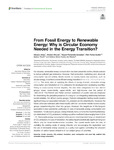From Fossil Energy to Renewable Energy: Why is Circular Economy Needed in the Energy Transition?

View/
Use this link to cite
http://hdl.handle.net/2183/31766Collections
- Investigación (FEE) [923]
Metadata
Show full item recordTitle
From Fossil Energy to Renewable Energy: Why is Circular Economy Needed in the Energy Transition?Author(s)
Date
2022Citation
Ishaq M, Ghouse G, Fernández-González R, Puime-Guillén F, Tandir N and Santos de Oliveira HM (2022) From Fossil Energy to Renewable Energy: Why is Circular Economy Needed in the Energy Transition? Front. Environ. Sci. 10:941791. doi: 10.3389/fenvs.2022.941791
Abstract
[Abstract]: For decades, renewable energy consumption has been presented as the ultimate solution
to reduce pollutant gas emissions. However, their production, marketing, and, above all,
consumption are not entirely climate neutral, so society needs new practices, such as
circular energy, to achieve a more efficient energy transition (Khan et al., 2021a; Khan et al.,
2021d). This study aims at exploring the effects of energy intensity, renewable energy
consumption and forestation on CO2 emissions for developed and developing countries.
Owing to cross-country income disparity, the data were categorized into four distinct
groups: lower, lower-middle, upper-middle, and high-income over the period of
1980–2018. The Pedroni and Fisher-Johnson estimators of pooled data are employed
for determining the plausible presence of a long-run co-integrating relationship between
model variables. For all four country groups, Pedroni cointegration testing results reveal a
significant long-run association between CO2 emission and its determinants. However, the
Fisher-Johansen estimator yield mixed results, with low- and lower-middle income country
groups outperforming the other two groups. However, the magnitude of this long-run
association is less substantial, particularly in case of renewable energy consumption and
forestation. For all country groups, energy intensity turns out to be the most influential longrun determinant of CO2 emissions, holding a positive coefficient value ranging from 0.30 to
1.31. Renewable energy consumption is the second most important long-run determinant
of CO2 emissions. In case of forestation, the series imparts (statistically) significant long-run
effects only for lower-middle-income countries. The overall results back the idea of
curtailing the existing levels of energy intensity and encouraging the exploration and
the use of renewable energy sources as a policy tool against controlling the prevalent
situation of carbon-based emissions in our subject group of countries.
Keywords
Circular economy
CO2 emission
Forestation
Panel cointegration and panel fully modified OLS
Renewable energy consumption
CO2 emission
Forestation
Panel cointegration and panel fully modified OLS
Renewable energy consumption
Editor version
Rights
Atribución 4.0 Internacional
ISSN
2296-665X






